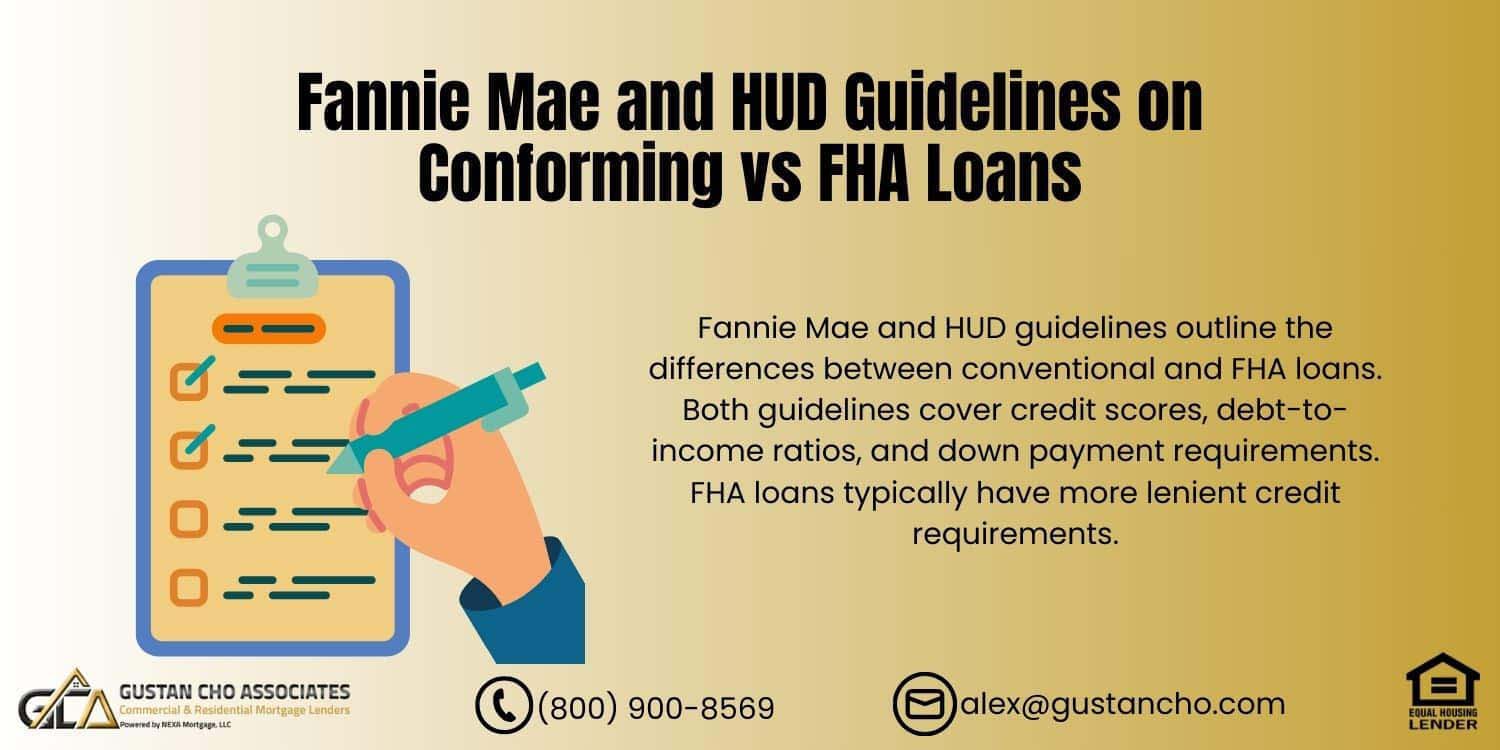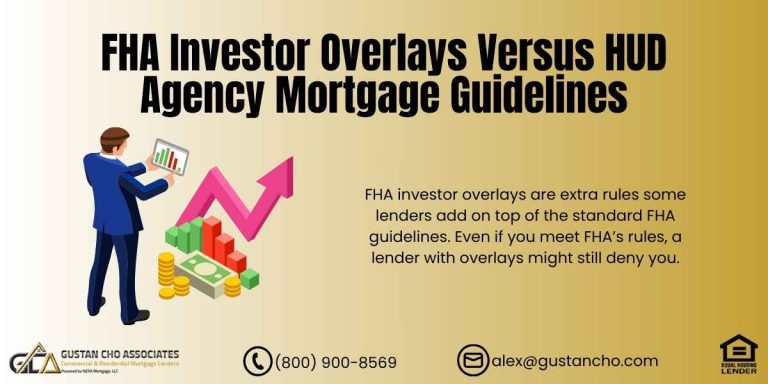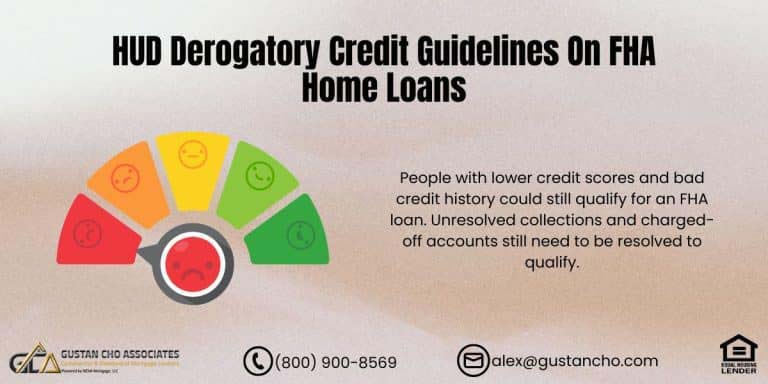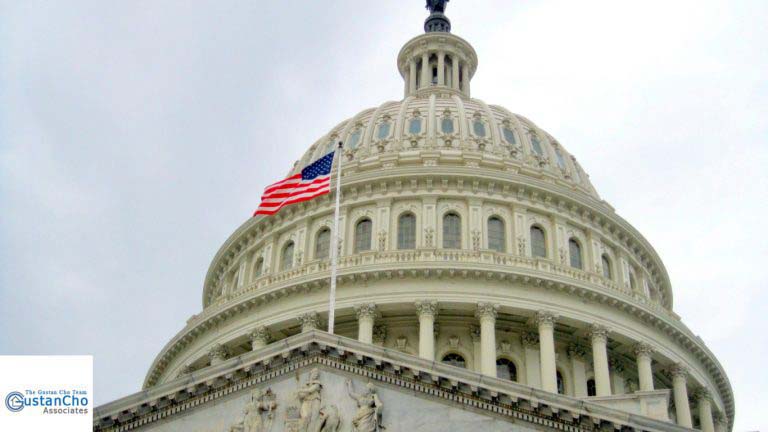This guide covers Fannie Mae and HUD Guidelines on conventional versus FHA loans. Fannie Mae and HUD guidelines on conventional versus FHA loans are similar but has differences. It is easier to get an approve/eligible per automated underwriting system (AUS) on FHA versus conventional loans.
FHA loans is the easiest loan program to get an automated underwriting system approval with outstanding collections, charged off accounts, and derogatory credit tradelines.
All owner-occupant home mortgages do not require outstanding collections and charged off accounts to be paid off. This includes conventional loans. You do not have to pay outstanding collections and charged-off accounts on owner-occupant conventional loans. However, the automated underwriting system may render a refer/eligible versus an approve/eligible per AUS if there are multiple collections or charged off accounts on conventional loans.
Differences Between Fannie Mae and HUD Guidelines on Conventional Loans
Here are differences between FHA versus Conventional loans: Regards to credit: The minimum credit score to qualify for FHA loans is 500 FICO. Anyone with under 580 credit scores and down to 500 FICO requires a 10% down payment. The minimum credit score to qualify for a 3.5% down payment FHA loan is 580 FICO. The minimum credit score to qualify on conventional loans is 620 FICO
Differences Between Fannie Mae and HUD Guidelines on Debt-to-Income Ratio
To get an approve/eligible per automated underwriting system (AUS) on FHA loans is 46.9% front end and 56.9% back end DTI. The maximum debt to income ratio to get an approve/eligible on conventional loans is a back end of 50% DTI. There is no front end debt to income ratio requirements on conventional loans
Fannie Mae and HUD Guidelines on Non-Occupant Borrowers
HUD, the parent of FHA, requires non-occupant co-borrowers to be related to the main borrower by law, blood, marriage on a 3.5% home purchase FHA loan. If the non-occupant co-borrower is not related to the main borrower by law, blood, marriage, then HUD requires a 25% down payment on a home purchase FHA loan. Fannie Mae and Freddie Mac does not require non-occupant co-borrowers to be related to the main borrower. Friends, business associates, or other people can become non-occupant co-borrowers without any family relationship on a 3% to 5% down payment conventional loan
Fannie Mae and HUD Guidelines on Collections Accounts and Charged-Off Accounts
Both HUD and Conventional loans do not require unpaid collections and charged-off accounts to be paid to qualify for a mortgage. However, HUD requires mortgage underwriters to take 5% of the outstanding balance on collection accounts and use it as a monthly hypothetical debt. This is just a hypothetical debt that does not need to be paid. This rule is implemented by HUD in the event if the collection agency ever proceeds with further collection activities and it turns into a judgement. Fannie Mae and Freddie Mac does not require 5% of the outstanding collection account balance to be used as a hypothetical debt. Conventional loans are exempt from the 5% rule
Fannie Mae and HUD Guidelines on Waiting Period After Bankruptcy And Foreclosure
There is a two year waiting period after Chapter 7 Bankruptcy on FHA loans. There is a three year waiting period after a foreclosure, a deed in lieu of foreclosure, a short sale to qualify for an FHA loan. Borrowers in Chapter 13 Bankruptcy repayment plan can qualify for an FHA loan after one year into the repayment plan via manual underwriting and trustee approval
There is no waiting period period after Chapter 13 Bankruptcy discharged date. However, if the Chapter 13 bankruptcy discharge has not been seasoned for at least two years, then the file needs to be manually underwritten
There is a four year waiting period after Chapter 7 Bankruptcy to qualify on conventional loans. There is a four year waiting period after Chapter 13 Bankruptcy dismissal date on conventional loans. There is a two year waiting period after Chapter 13 Bankruptcy discharged date on conventional loans. There is a four year waiting period after a deed in lieu of foreclosure or a short sale on conventional loans. There is a seven year waiting period after a regular foreclosure to qualify for conventional loans.
Fannie Mae and HUD Guidelines on Mortgage Included as Part of Bankruptcy
If you have a prior mortgage included in bankruptcy and the mortgage was not reaffirmed, there is a four year waiting period after bankruptcy discharged date. The date of the housing event does not matter. However, this is not how it applies on FHA loans. On FHA loans, if you had a mortgage included in bankruptcy, there is a three year waiting period from the date of the housing event. A housing event is a foreclosure, deed in lieu of foreclosure, or short sale.
Fannie Mae and HUD Guidelines on Mortgage Guidelines on Student Loans
Fannie Mae and Freddie Mac and FHA loans allow Income-Based Repayment (IBR) on student loans. This holds true even though it is a zero IBR payment. Otherwise, 0.50% of the outstanding student balance will be used as a monthly hypothetical debt.
FHA loans do not allow for IBR payments. 0.50% of the outstanding student loan balance is used as a hypothetical month debt by mortgage underwriters.
Or the borrower can get a written statement on what a hypothetical monthly payment over a fully amortized extended term will be. This figure is normally 0.45% of the outstanding student loan balance. This figure can be used in lieu of the 0.50% of the outstanding student loan balance
Fannie Mae and HUD Guidelines on Collections and Charge-Offs
Most borrowers do not even consider conventional loans if they have collection accounts and outstanding charge off accounts. They figure that FHA Loans is the way to go if borrowers have outstanding collections and charge off accounts. Can you qualify for a conventional loan with collection accounts and charge off accounts with a conventional loan? Homebuyers can qualify for all owner-occupant home loan programs with collection and charge off accounts. Fannie Mae and Freddie Mac allow outstanding collections or charged-off accounts on owner-occupant primary home conventional loans only.
It is tougher to get an approve/eligible per automated underwriting system with many outstanding collections or charged off accounts on conventional loans versus FHA loans.
HUD is more lenient in getting an approve/eligible per automated underwriting system when it comes to outstanding collections and charge off accounts on FHA loans. Depending on the mortgage program, each mortgage loan program algorithm is different on the automated underwriting system. When it comes to unpaid collection accounts, charge offs, tax liens, late payments, and judgments, the automated underwriting system do not view it favorably. Again, FHA and VA loans are more lenient when it comes to approving a borrower on the automated underwriting system than any other mortgage program.
HUD Guidelines on Outstanding Collections and Charged-Off Accounts
FHA Loans is known for its lenient guidelines on collections and charges offs: With HUD Guidelines on collections and charge-offs, collection accounts and outstanding charge off accounts do not have to be paid to qualify for an FHA insured mortgage loan. HUD has different requirements on non-medical collections versus non-medical collections. Medical collections on HUD Guidelines on collection accounts are exempt from debt-to-income ratio calculations and the balance is immaterial.
Case Scenario of Exempt Collection Accounts on FHA Loans
For example, here is a case scenario: If borrowers have a total of $2,000 or more in non-medical collections, then HUD requires underwriters to take 5% of the outstanding unpaid non-medical collection balance. The 5% of the outstanding collection accounts is not taken into consideration by mortgage underwriters as the borrower’s monthly hypothetical debt. But if the outstanding non-medical outstanding collection account balance is greater than $2,000, it is used as a hypothetical monthly debt.
Medical collections are exempt from the 5% rule. Non-medical collections that are older than 2 years old are exempt from the 5% rule
Fannie Mae and Freddie Mac does not require the 5% of the outstanding collection account balance to be used on conventional loans. You can have unpaid collection accounts and do not have to pay them on owner-occupant primary home conventional loans. PLUS, the 5% rule does not apply.
Home Loans With Outstanding Judgments and Tax Liens

You need to provide three months canceled checks or bank statements. You cannot pre-pay them upfront. Fannie Mae Mortgage Guidelines does not accept tax liens.
You can qualify for conventional loans if you have outstanding tax debt but not tax liens. You need to make a written payment agreement with the IRS. You need to make at least one payment from your written payment agreement prior to closing on conventional loans. We will do a Fannie Mae and HUD Guidelines and compare and contrast between the two. We will compare Fannie Mae and HUD guidelines on collections and charge-offs and see if borrowers can qualify for both or one or the other.
Fannie Mae and HUD Guidelines on Collections and Charge-Offs
Borrowers can qualify for Conventional Loans with outstanding charge offs and collections. Each mortgage program has its own requirements when it comes to collections and charge off accounts.
FHA loans has the most lax requirements on mortgage lending guidelines on collections and charge offs. Mortgage guidelines on collections are most strict to get an approve/eligible per AUS on owner-occupant conventional loans.
This holds true if the borrower has many unpaid collections with large balances We will do analysis and contrast on FHA versus Conventional Loan Guidelines on Collections, Charge Offs, and derogatory credit.
Requirements For Fannie Mae And Freddie Mac With Collection Accounts
Conventional lending guidelines are much different than FHA mortgage lending guidelines with regards to unpaid collection accounts, charge offs, tax liens, and judgments. On owner-occupant primary home conventional loans, unpaid collections does not need to be paid as long as the borrower gets an approve/eligible per automated underwriting system (AUS).
Tax liens are not allowed on conventional loans and need to be paid at or prior to closing. FHA , VA, USDA loans are for owner-occupant home financing only.
You cannot finance second homes and/or investment properties with government-backed loans. However, Fannie Mae and Freddie Mac allow for second home and investment property financing with conventional loans. Collection accounts of $250 or less or total aggregate unpaid balance of $1,000 or less may be exempt upon underwriter’s discretion on investment property conventional loans. 5% of the outstanding collection account balance is not used as a hypothetical debt on conventional loans.
Collection Account Requirements on Conventional Loans
You can have unpaid collection accounts and qualify for an owner-occupant primary home Conventional loans: Both Fannie Mae, Freddie Mac, and HUD mortgage guidelines do not require collection accounts to be paid on owner-occupant mortgages
But with non-medical collections, any aggregate balance of over $2,000, 5% of the outstanding balance will be used to calculate debt to income ratios on FHA loans but not conventional loans.
This holds true even though the borrower does not have to pay. Medical collection accounts are exempt with having to be paid or using a portion of the outstanding balance to calculate debt-to- income ratios on FHA loans. For non-medical collection accounts, if the aggregate unpaid balance of collection accounts is greater than $2,000, then 5% of the unpaid collection account balance will be used towards debt to income calculations on FHA loans but not conventional loans.
Case Scenario of HUD Guidelines on Collection Accounts
For example, here is a case scenario: If a borrower has $10,000 worth of unpaid collection accounts. Then 5% of the unpaid $10,000 total aggregate collection account balance. Or $500 will be used to calculate borrower’s debt-to-income ratios. This is the case even though the $500 per month does not have to be paid on FHA loans. The mortgage underwriter will use the $500 per month as part of the borrower’s hypothetical monthly debt on FHA loans. This does not apply on conventional loans.
Written Payment Agreement With Creditors
If outstanding collection accounts is of a large amount, HUD will allow a written payment agreement arrangement with creditors on FHA loans: This is where borrowers can make a written payment agreement with the creditor with the collection accounts in lieu of the 5% collection account balance calculation. That new payment agreement that is agreed up will be used in lieu of the 5%. The date this figure goes effective is the date the written payment agreement has been signed and executed by both parties.
Case Scenario on Fannie Mae and HUD Guidelines on Collection Accounts
Here is a case scenario: The borrower has a total collection account balance of $20,000. Agrees with the creditor and sets up a written payment agreement with the creditor or collection agency for $200 per month. That $200 per month will be used in lieu of the 5% of the $20,000, or $1,000, in the calculation of debt to income ratios.
HUD mortgage guidelines are very generous with lending requirements for home buyers and homeowners wanting to refinance their current home loans with judgments, tax liens, and other liens such as mechanics liens.
HUD, the parent of the Federal Housing Administration, allows borrowers who have judgments and tax liens to set up a written payment agreement with the judgment creditor or the Internal Revenue Service on FHA loans. Three months of payments and seasoning is required. It is easier to get an approve/eligible per automated underwriting system (AUS) for borrowers with bad credit, large outstanding collections/charged-off accounts, and other derogatory credit tradelines. The key in getting an approve/eligible is to have rebuilt and reestablished credit after the period of bad credit and have timely payments in the past 12 months.
Fannie Mae and HUD Guidelines on Collections and Charge-Offs For Conventional Loan With Derogatory Items
Fannie Mae and HUD Guidelines on collections and charge-offs: Conventional guidelines are much different than FHA lending guidelines with regards to. Outstanding collection accounts, charge offs, tax liens, and judgments. Unpaid collections and charged off accounts do not have to be paid on owner-occupant conventional loans. You cannot have tax liens on conventional loans. You can have outstanding tax debt your owe to the IRS but will need a written payment agreement and make at least one payment prior to closing.
5% of all unpaid collection account balance will not be taken into consideration when mortgage underwriters calculate the borrower’s debt-to-income ratio.
Judgments do not have to be paid in full as long as the borrower has a written payment agreement with the judgment creditor. Three months of timely payments to the judgment credit needs to be make. You cannot prepay the full three months of monthly payments in advance to qualify for a mortgage upfront. Outstanding collection accounts of $250 or less or total aggregate unpaid balance of $1,000 or less may be exempt upon underwriter’s discretion on investment properties.
If you are looking to qualify for a conventional loan with a lender with no lender overlays on government and conventional loans, please contact us at Gustan Cho Associates at 800-900-8569 or text us for a faster response. Or email us at gcho@gustancho.com. The team at Gustan Cho Associates is available 7 days a week, evenings, weekends, and holidays.
FAQs: Fannie Mae and HUD Guidelines on Conforming vs FHA Loans
1. What are Fannie Mae and HUD guidelines on conventional versus FHA loans? Fannie Mae and HUD guidelines outline the differences between conventional and FHA loans. Both guidelines cover credit scores, debt-to-income ratios, and down payment requirements. Still, FHA loans typically have more lenient credit requirements.
2. Is getting approved for an FHA loan easier than a conventional loan? According to Fannie Mae and HUD guidelines, FHA loans are generally easier to get approved for, especially if you have outstanding collections or charged-off accounts.
3. What is the minimum credit score required for FHA and conventional loans? FHA loans have different credit scores and down payment requirements than conventional ones. For FHA loans, a minimum credit score of 500 is needed with a 10% down payment, and a score of 580 is required with a 3.5% down payment. Conventional loans, however, require a minimum credit score of 620.
4. Do I need to pay off my collections and charged-off accounts to qualify for a mortgage? No, Fannie Mae and HUD guidelines do not require you to pay off outstanding collections and charged-off accounts for owner-occupant home mortgages, including both FHA and conventional loans.
5. Can non-occupant co-borrowers be friends or business associates on conventional loans? Fannie Mae and HUD guidelines allow non-occupant co-borrowers to be friends or business associates on conventional loans, unlike FHA loans, which require non-occupant co-borrowers to be related by law, blood, or marriage.
6. According to Fannie Mae and HUD guidelines, what are the waiting periods after bankruptcy and foreclosure? FHA loans have a two-year waiting period after Chapter 7 bankruptcy and three years after foreclosure. Conventional loans have a four-year waiting period after Chapter 7 bankruptcy and seven years after foreclosure.
7. How do Fannie Mae and HUD guidelines handle student loan debt? FHA and conventional loans permit using income-based repayment (IBR) for student loans. However, with FHA loans, if no IBR plan is in place, they also take into account 0.50% of the remaining student loan balance as monthly debt.
8. Are there debt-to-income ratio requirements for FHA and conventional loans? According to Fannie Mae and HUD guidelines, FHA loans have a maximum debt-to-income ratio of 46.9% front-end and 56.9% back-end. Conventional loans have a maximum back-end ratio of 50%.
9. What happens if I have unpaid collections or charge-offs? Fannie Mae and HUD guidelines state that unpaid collections and charge-offs do not need to be paid for FHA and conventional loans. However, FHA loans may require 5% of the outstanding balance to be considered hypothetical debt.
10. Can I qualify for a mortgage with outstanding tax liens or judgments? According to Fannie Mae and HUD guidelines, you can qualify for an FHA loan with outstanding tax liens or judgments if you have a written payment agreement and have made three timely payments. Conventional loans require the tax liens to be paid before or at closing.










All loan programs do not require charged offs and collection accounts to be paid off on owner occupied home financing. Reason why many lenders require that charge off accounts and collections be paid off is not due to agency mortgage guidelines but because the lender has overlays. Gustan Cho Associates is one of a few national lenders who has no lender overlays on government and conventional loans. We are a true no overlay lender. Collection and charge off accounts do not have to be paid off on FHA, VA, USDA and conforming loans.